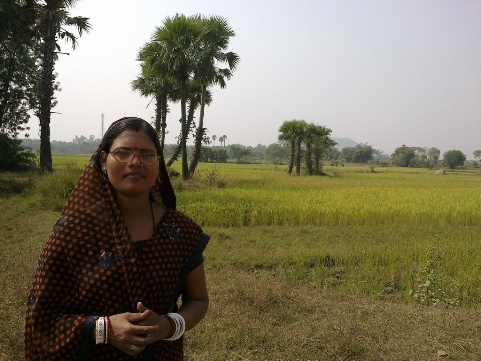Standing up to violence and corruption: Manjulata Sahoo
Date:
Dhenkanal district (Odisha) - Manjulata Sahoo does not know the word ‘governance’ or ‘political participation’. But her story exemplifies the true meaning of what a woman leader can do.
As the first woman Sarpanch of Nadhara Gram Panchayat in Odisha state of India, Manjulata has endured brutal physical assault, blackmail and threatening calls from villagers. But this did not prevent her from ensuring that 100 old and disabled people in her village got pensions.
Her efforts have helped 25 poor people including widows got free housing and three tube-wells provide drinking water to villagers, school children and young infants in the anganwadi centres.
Manjulata feels that training by UN Women with The Hunger Project and People’s Institute for Participatory Action (PIPAR) have helped her overcome her fears and motivated her to perform better. “I get tremendous mental, physical and emotional support from the team,” she says.
“Earlier women would not have a say in most matters because the men had the upper hand, both at home and at panchayats. But after receiving training, women now actively participate in the decision making process,” says Shankar Sana Hota, Trainer, PIPAR. He feels the capacity building and leadership programmes have helped in educating women.
The establishment of the Jagruk Manch, another strategy of the programme has helped to uplift the spirits of the women. Having worked as a Sarpanch for almost five years now, she feels she has been able to fulfill most of the villager’s expectations.
In her tenure as Sarpanch, 65 families have been granted housing under the Indira Awaas Yojana (a national housing scheme). Vegetable gardens have sprung up across the village, especially in areas that were very underdeveloped. Individual cultivation is also encouraged, with fertilizer seeds being provided by the Sarpanch.
It has not, however, been a smooth ride for Manjulata who has faced numerous hurdles in her fight against corruption. She came to know that a fellow member of the village council was enjoying the benefits of the Indira Awaas Yojana meant for poor and homeless people. She complained to the Block Development Officer and even endured severe physical assault by the ward member’s family but in the end it was transferred to a poor widow. “I was under the priority list for the Indira Awaas Yojana but it was instead granted to a ward member. It was because of the support of Manjulata that I managed to receive the grant. It will certainly make a difference in my life,” says 20-year-old Kalpana Behra, a widow and a mother of two small children.
There are several other people like Kalpana whose lives have changed for the better thanks to Manjulata’s efforts. In another instance, an official managing the National Rural Employment Guarantee Act got a project sanctioned twice from the government.
Manjulata opposed it and sent letters to various bureaucrats and politicians such as the Block Development Officer, Member of the Legislative Assembly and Member of the Parliament. She received death threats for her decision. The case is now being investigated and the project has been stalled.
People believe that Manjulata is as capable as any male panchayat leader. “Earlier women did not come out, but now seeing Manjulata, they come to meetings and express their views. They have become a part of the development process here,” says Mayadhar Behera, President, Village Committee, Nadhara.
Manjulata says she got the courage to keep working from the trainings organized by UN Women with The Hunger Project and PIPAR, a local non governmental organisation. “At these trainings, I got the confidence to deal with these challenges. I got tremendous support from the team, and they urged me to continue working despite all my problems,” says Manjulata.
Despite her injuries, she will stand for the next panchayat elections.
